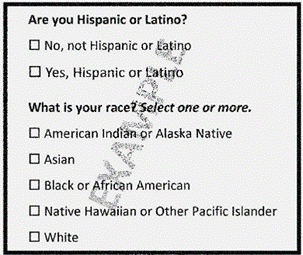Data collection and statistical analysis by the federal government are often viewed as some of the most mundane and boring acts by bureaucracy. Yet, information can drive critical policy decisions that directly affect our day-to-day affairs, ranging from education to health care to housing. Billions of dollars and millions of lives can be affected.
Time has shown that the way that the government collects data is flawed and has serious consequences for underserved communities. When individuals go uncounted or miscounted, people are unseen and forgotten in everything from urban planning to the number of books and desks at public schools to food preparation and mental health services. Nonprofit advocacy is working to change that.
Every federal agency is required to ask the same questions in the same format. Are you Hispanic or Latino? What is your race? Select one or more. While we may be familiar with checking a box and moving on, few consider what happens next. However, consider this: more than $1.5 trillion are at stake for communities based on this data.

As evidenced during the global pandemic, the standardized question design and response pattern for race and ethnicity results in poor data and have significant consequences. By the way they have been designed, these questions hide millions of people who identify as Hispanic or Latino/Latina or a race or ethnicity not listed at all like Middle Eastern or North African (MENA). Many Hispanic or Latino/Latina individuals are also miscounted due to confusion in separate questions for race and ethnicity because they do not see themselves as fitting into any of the race categories listed. Thus, they either skip the question or choose the option “Some Other Race.” In the 2020 Census, 26.2 million out of 27.9 people who were of Hispanic or Latino origin self-identified as “Some Other Race.” When this occurs, some are “assigned” by the Census Bureau to the White category, further inflating the White category while diminishing the proper race and ethnic categories.
“Real people and groups fall through the cracks when they are miscounted or are improperly lumped into the wrong category,” according NCN’s comments in support of changes to how the questions are asked.
Additionally, disparities in access to health, education, employment, housing, and civil rights for persons who identify as MENA was an “unseen crisis” because these persons, without the option to self-identify as MENA, have historically been absorbed into the White category. “Historic records of how the federal government has requested and analyzed demographic data have effectively hidden the realities of who lives in the United States and how individuals identify within society. This lack of knowledge has resulted in cultural, linguistic, and systemic barriers to accessing government services and other forms of aid,” according NCN’s comments in support of changes. As explained in comments by the Michigan Nonprofit Association, Council of Michigan Foundations, and Michigan Association of United Ways in support of the OMB Proposal: "Data collection, disaggregation, and reporting are central to understanding and meeting community needs as well as ensuring that different ethnic and racial groups are seen. Without the [Middle Eastern or North African (MENA)] category, nonprofits bear a huge financial burden to raise funds for private studies to inform their programming for the communities they serve. In addition to being expensive, these studies usually are not as comprehensive or conclusive as federal data would be."
Given these consequences, the Office of Management and Budget (OMB) is attempting to fix this problem and bring light to certain invisible groups through an equally mundane, yet important, act of government – changing how questions regarding race and ethnicity are asked on government forms. OMB’s Initial Proposals for Updating OMB’s Race and Ethnicity Statistical Standards recommends two policy changes: (1) to combine race and ethnicity into one question for Hispanic and Latino/Latina; and (2) to add a Middle Eastern or North African (MENA) response category.
So, while it may seem annoying, and while you can opt out, know that the next time you are filling out one of these forms you are providing vital information that informs how your community is seen by the government and helps determine how the government will allocate billions each year.
To the public, the message is: be counted so everyone can be counted.
To nonprofit advocates, the point remains that if the government form is incomplete and inadequate, band together to find a way to change it – for the public good.
